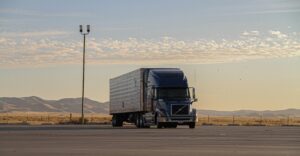Utilizing electric trucks for brief, recurring journeys to manufacturing facilities is on the rise as a growing number of OEMs insist on suppliers hushing the clamor and eradicating the diesel emissions linked with transporting incoming parts and components.
How did the emergence of inbound logistics become a phenomenon in an industry where change typically encounters opposition? Stakeholders, ranging from environmentally conscious shippers to regulators and OEMs, find merit in inbound logistics as an ideal scenario for the integration of electric trucks, each for their own motivations.

The rationale behind this being a favorable early adoption is that the trucks remain in close proximity to their base. Mike Roeth, NACFE executive director, highlighted their ability to cover significant distances, especially in short-return heavy-duty day cab tractors.
Ideal use case
At Volvo Trucks North America’s Virginia plant, 95,000 electric miles were covered, delivering crucial supplies on dedicated routes. Volvo Trucks North America has been at the forefront of incorporating electric trucks into its inbound plant logistics operations, and the results have been overwhelmingly positive.
In October 2021, Watsontown Trucking Co. and Camrett Logistics took the initiative by ordering Class 8 VNR Electric trucks. By December of the same year, these trucks were already in active service, completing round trips to NRV. Furthermore, Ryder System Inc. joined the electric revolution by deploying seven VNR Electric trucks, efficiently transporting assembly kits of components for heavy-duty Mack trucks to a kitting facility located in Pennsylvania. The move towards electric trucks is not just a step forward; it’s a transformative experience shaping the future of sustainable transportation.
‘Manufacturing shuttles’
“We refer to these as manufacturing shuttles,” Roeth exclaimed, gesturing towards Schneider’s implementation of electric trucks during NACFE’s Run on Less Electric Depot program last year. Schneider dubs it the “next truck up” system, a replacement for the traditional two-driver slip-seating, prioritizing trucking safety and compliance. “Upon returning the truck to the depot, it begins charging and seamlessly transitions to another truck that is fully charged,” Roeth explained. Currently, Schneider boasts a fleet of 92 eCascadias, complemented by a robust 4.8-megawatt charging facility in El Monte, California, with the capability to charge 32 trucks simultaneously.
NFI Industries, an early collaborator with Daimler Truck North America (DTNA) in testing Class 8 Freightliner eCascadias, experimented with this approach at its Chino, California, depot in early 2020.
DTNA initiated the integration of eCascadias into its logistics operations in Portland, Oregon, in November. These electric trucks utilize the Electric Island heavy-duty truck charging station, inaugurated in 2021 near the company’s Portland headquarters. The initial deployment of four electric trucks focuses on picking up parts from Pacific Northwest suppliers and efficiently delivering them to DTNA’s consolidation center.
‘Sustainable future’

“In an effort to minimize our ecological footprint and foster a more sustainable future extending beyond truck development and production, Jeff Allen, Senior Vice President of Operations and Specialty Vehicles at DTNA, expressed our commitment to integrating electric trucks into our inbound logistics network,” stated a news release from November.
During December, Daimler’s Mercedes-Benz Trucks brand successfully delivered a fleet of a dozen electric trucks to a logistics service provider. Commencing this quarter, these trucks will embark on 50 all-electric inbound logistics runs to our largest plant in Wörth, Germany. The overarching objective is to achieve 100% electrification of delivery traffic to Wörth by the conclusion of 2026.
Karin Rådström, CEO of Mercedes-Benz Trucks, emphasized in December, “Electric trucks are already capable of covering the majority of delivery routes spanning short and medium distances. Our aspiration is to minimize the environmental impact throughout the entire value chain, encompassing inbound logistics at our Wörth plant.”
Is Mack’s $14.5 million expansion of the Roanoke plant a strategic move in response to the UAW?
The timing of the announcement for the expansion of Mack Trucks’ medium-duty plant in Roanoke, Virginia, raised eyebrows – why unveil positive news at 5:30 p.m. on a Friday? One plausible explanation is the awaited approval from Gov. Glenn Youngkin’s office, as the state is contributing a $255,000 grant from the Commonwealth’s Opportunity Fund.
Alternatively, the timing could be a deliberate choice to catch the United Auto Workers off guard, potentially sidestepping any protests during the ceremonial groundbreaking at the nonunion plant. It’s worth recalling the 39-day strike the UAW staged against Mack last fall, ultimately settling for a contract they had previously rejected.
The strike at Mack’s primary assembly plant near Allentown, Pennsylvania, on Oct. 8, had broader repercussions, affecting four other facilities, including a remanufacturing operation, parts depots in Maryland and Florida, and the Hagerstown, Maryland, engine plant. This disruption halted most Mack Class 8 truck builds, leading to delays in deliveries to Volvo Trucks North America’s plant in Dublin, Virginia, contributing to a six-tenths of a point loss in North American market share for Volvo in 2023.
While the Mack strike primarily focused on economic gains and local concerns rather than job creation, the UAW never publicly indicated any plans to organize the Roanoke plant. The expansion, aimed at producing diesel and battery-electric medium-duty trucks, is set to bring in 51 new jobs, accompanied by Roanoke County incentives totaling $842,420.
Nikola Firmly Rejects Trevor Milton’s Offer and Pursues Legal Action for Unsettled Debt
Trevor Milton seems to persist as an unwelcome presence at Nikola Corp, akin to the recurring appearance of a proverbial bad penny. The founder of the electric truck manufacturer and energy distribution company is currently awaiting a surrender date for his four-year federal prison sentence following his October 2022 conviction on one count of securities fraud and two counts of wire fraud.
Once Nikola’s predominant shareholder, Milton’s stake, now at approximately 4.4%, has dwindled significantly, attributed in part to the company’s issuance of new stock, thereby diluting his ownership as shares are traded.
Despite an arbitration ruling mandating Milton to pay Nikola a substantial $165 million, primarily to cover a Securities and Exchange Commission fine related to his misleading statements about the company’s technological achievements, Nikola had refrained from directly criticizing him. However, this changed on Jan. 26 when Milton proposed a slate of dissident candidates for independent directors.
In response, the company issued a statement, noting, “The director nominees have no public company experience, contribute no skills or experience to the board, and undeniably lack the depth of experience that the current Nikola board members bring to the company.”
Highlighting Milton’s minimal involvement in Nikola’s day-to-day operations since September 2020, the statement pointed out that the company continues to endure consequences resulting from Milton’s past business decisions as the founder and executive chairman.
Adding to the complexity, Milton has yet to fulfill the $165 million payment, plus accrued interest, owed to Nikola. The company is actively exploring all available legal avenues to recover the outstanding amount.
In California, it’s deja vu all over again
In a case of deja vu, California Governor Gavin Newsom rejected legislation in September that aimed to effectively prohibit heavy-duty autonomous trucks in the state. Now, almost identical legislation is awaiting review in the California State Assembly.
State Assembly member Cecilia Aguiar-Curry, speaking at a rally supported by the Teamsters union on Monday, described the pending legislation as a “commonsense measure that keeps humans on board a truck until we have a plan for our workers, and we’re sure that tech bros aren’t pushing unsafe technology down our throats.”
This situation echoes the events of last year when Assembly Bill 316 received approval from 90% of Assembly and Senate members before Governor Newsom issued a veto. Notably, there was no attempt to override the governor’s decision.
What sets this episode apart? The current debate intertwines some high-profile accidents involving autonomous robo-taxis with the potential implications of a crash involving a driverless 80,000-pound truck.
Governor Newsom’s office has stated that it will evaluate the legislation based on its merits, leaving the fate of the proposed measures hanging in the balance.





